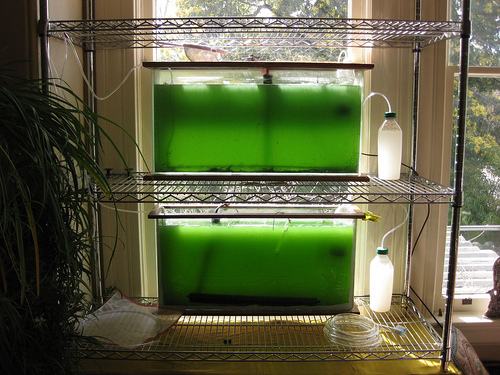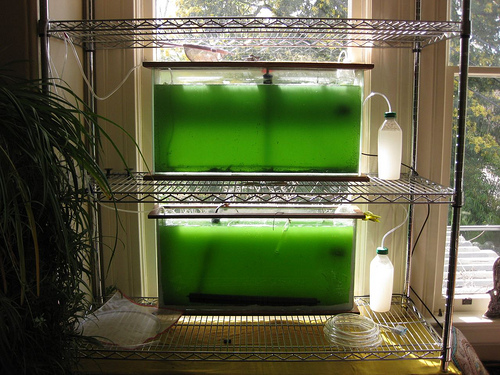As 2010 winds down and 'Best Of' lists pop up, it seems appropriate to look back at the year in sharing as drawn here on Shareable. A lot of topics have been covered this year, a lot of information gleaned, a lot of futures imagined. Here are Shareable's top 10 articles for 2010 as determined by you, the readers:
1. Are Algae the DIY Answer to Fuel & Food Crises?
Aaron Baum, a research consultant for NASA's OMEGA project, has made algae his mission in life. The NASA project is largely focused on using algae to make biofuels, but Baum credits the organisms with multiple uses. What he has learned is that algae, when utilized properly, can give you “clean water, fuel, food, fertilizer and extra oxygen.” As an example, controlled algae blooms in the ocean help reduce the excessive nutrients that create dead zones and harm marine life. Closer to home, Baum contends that algae is a superfood that we should all be including in our lives: “Algae as a food is extremely healthy. It's high in complete protein, antioxidants, omega-3 fatty acids, and it's effective against infections. It has defenses against viruses and you can acquire defenses as well. It's good to protect against environmental toxins.”

Photo courtesy of The Algae Lab.
2. Can We Design Cities for Happiness?
During Enrique Peñalosa's three-year stint as mayor of Bogotá, Colombia, he set his sights on improving the quality of life for his constituents. Seeing all of the issues at hand through a lens of social justice, he built schools, libraries, nurseries, and bike paths, along with planting 100,000 trees and providing water service to every single household. In essence, he put the commons to work for the people as a way of shrinking the equality gap in his city. “If we in the Third World measure our success or failure as a society in terms of income, we would have to classify ourselves as losers until the end of time,” Peñalosa explains. “So with our limited resources, we have to invent other ways to measure success. This might mean that all kids have access to sports facilities, libraries, parks, schools, nurseries.”
3. Dude, Where's Our Car?
When the recession came calling, Corbyn Hightower and her family tried their darnedest to hang tough. After all, downsizing happens. And so the Hightowers set to trimming expenses by cutting out all of their non-essential expenditures. That still didn't balance the books, so the car was next to go: “I was half-joking when I suggested dumping the car-ownership idea altogether and instead spend some money on good, reliable bikes, trailers to tow cargo and kids, good locks and helmets and weather gear. The joke gained seriousness when we reasoned that it might actually work. It might feel good. It might feel like the right thing to do.” What Corbyn and company have learned is that the library is your friend, as is the park. Another takeaway — family meals don't need to include meat or video games because rice, beans, in-season vegetables, and good conversation can make for an awfully pleasant and affordable evening.
4. The Exterminator's Want-Ad
In his entry into the Shareable Futures short story series, Bruce Sterling imagines a world without cars, chain stores, or fast food, but replete with roof gardens. In his Sustainable Utopia, you'll find “Lots of liberty, equality, fraternity, solidarity, compost dirt, unshaved legs and dense crowding. Otherwise, the crickets chirp.” This world has been devoured by the Liberated Socialist Masses. Lobbyists and other hacks for big corporations, here, find themselves jailed in a "resiliency commune" fashioned from a former gated community of McMansions and forced to read Henry David Thoreau.
5. The Guy Who Worked For Money
Benjamin Rosenbaum also contributed a piece to the Shareable Futures series. The inhabitants of his future scavenge for vintage Ikea pieces and splice genes, and working for money is a rarity. When a question about historical construction is posed, the lead character muses, “It was insane, in Nera's opinion, to be doing 1990s-style artisanal re-creationist construction — steel frame and drywall — three kilometers above ground. If they just printed bamboo and carbon thread out of compost like everyone else, the rest of the project might still get slagged for showboating, but at least their energy use wouldn't be over the top.”
6. Program or be Programmed
In his newest book, Program or be Programmed: Ten Commands for the Digital Age, author Douglas Rushkoff looks at the choices that face a technology-bound society. While Rushkoff believes that technology can and should play an important role in building a world of sharing, there is a profound choice that must first be made. He posits that either we take control and steer the ship toward a collectively beneficent future or we relinquish our power to a handful of technology czars and hope for the best. “Choose the former,” writes Rushkoff, “and you gain access to the control panel of civilization. Choose the latter, and it could be the last real choice you get to make.”
7. I Made An iPad eBook in One Weekend (And You Can Too!)
Though Paul Davis wasn't quick to jump on the iPhone bandwagon, he hopped the iPad bus as soon as it hit the station. Suffering rain while waiting in line outside a Chicago Best Buy, he made his purchase the first day they were available. His excitement was born from more than just the freedom from threat of paper cuts. As an independent publisher, Davis was interested in the publishing possibilities inherent in the device. Upon bringing home his new prized possession, Davis devoted his weekend to creating an eBook using the open-source ePub publishing tool. In the end, the results fully justified the expense, even for someone with his “general contrarian impulses and spendthrift tendencies.”
8. The Jammie Dodgers and the Adventure of the Leicester Square Screening
A third entrant from the Shareable Futures series finds Cory Doctorow on the hunt for the perfect phone to fulfill his mission. As it happens, he has to go back to the future to get the just-right model: a HTC Screenparty Mark I phone, circa 2014. The beauty of this particular gem of a phone is found in its projector. “That's the business, that projector. The Screenparty I was the first-ever phone ever delivered with a little high-powered projector built into it, and the only Android phone that had one, because ten minutes after it shipped, Apple dusted off some old patent on putting projectors in handheld devices and used the patent to beat the Screenparty I to death.”
9. The Real Good Chair Experiment
Blu Dot Studios had some good fun when they set 25 chairs out on the streets of Manhattan and then followed them using GPS and video surveillance. Eventually, they interviewed the various folks who took the chairs and found layers of thoughtfulness behind the proprietors' taking of the curbside giveaways. The result is an adorable little film.
Blu Dot Real Good Experiment from Real Good Chair on Vimeo.
10. A Factory in Every Home
Although 3D hardware printers have been around for decades, an open-source, personal version of the technology hasn't. That's where Adrian Bowyer and RepRap come in. In developing the equipment, Bowyer looked to the natural world for cues: “I started the RepRap printer by a biomimetic analogy, that is to say an analogy taking an idea in nature and putting it into engineering. The object in nature that I copied is the phenomenon of symbiosis.” The RepRap package costs around 500 Euros and is self-replicating so you can make one for a friend. The Guardian newspaper wrote, "[RepRap] has been called the invention that will bring down global capitalism, start a second industrial revolution and save the environment.”









